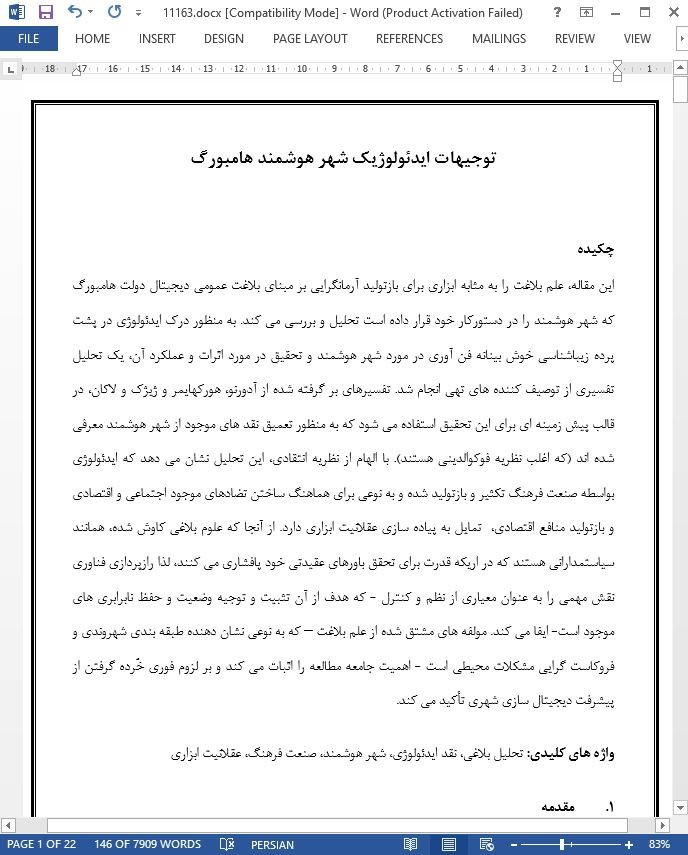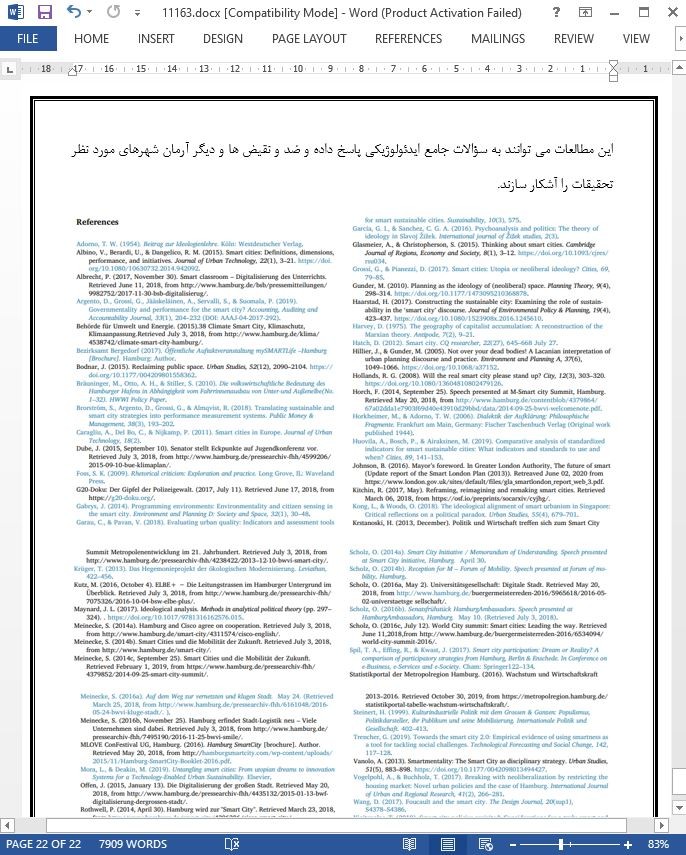
توجیهات ایدئولوژیک شهر هوشمند هامبورگ
چکیده
این مقاله، علم بلاغت را به مثابه ابزاری برای بازتولید آرمانگرایی بر مبنای بلاغت عمومی دیجیتال دولت هامبورگ که شهر هوشمند را در دستورکار خود قرار داده است تحلیل و بررسی می کند. به منظور درک ایدئولوژی در پشت پرده زیباشناسی خوش بینانه فن آوری در مورد شهر هوشمند و تحقیق در مورد اثرات و عملکرد آن، یک تحلیل تفسیری از توصیف کننده های تهی انجام شد. تفسیرهای بر گرفته شده از آدورنو، هورکهایمر و ژیژک و لاکان، در قالب پیش زمینه ای برای این تحقیق استفاده می شود که به منظور تعمیق نقد های موجود از شهر هوشمند معرفی شده اند (که اغلب نظریه فوکوالدینی هستند). با الهام از نظریه انتقادی، این تحلیل نشان می دهد که ایدئولوژی بواسطه صنعت فرهنگ تکثیر و بازتولید شده و به نوعی برای هماهنگ ساختن تضادهای موجود اجتماعی و اقتصادی و بازتولید منافع اقتصادی، تمایل به پیاده سازی عقلانیت ابزاری دارد. از آنجا که علوم بلاغی کاوش شده، همانند سیاستمدارانی هستند که در اریکه قدرت برای تحقق باورهای عقیدتی خود پافشاری می کنند، لذا رازپردازی فناوری نقش مهمی را به عنوان معیاری از نظم و کنترل - که هدف از آن تثبیت و توجیه وضعیت و حفظ نابرابری های موجود است- ایفا می کند. مولفه های مشتق شده از علم بلاغت – که به نوعی نشان دهنده طبقه بندی شهروندی و فروکاست گرایی مشکلات محیطی است - اهمیت جامعه مطالعه را اثبات می کند و بر لزوم فوری خُرده گرفتن از پیشرفت دیجیتال سازی شهری تأکید می کند.
1. مقدمه
یک معنای ضمنی پُرمایه و مثبت در مفهوم شهر هوشمند (SC) نهفته است که هم در بلاغت سیاسی و هم علوم دانشگاهی به آن پرداخته شده است. برنامه ریزان شهری به پیاده سازی راهکارهای هوشمند جهت ارتقای رقابت جهانی شهر، بهبود بهره وری محیطی و اقتصادی و تسهیل انعطاف پذیری ترغیب می شوند (آلبینو ، براردی ، و دانژلیکو ، 2015). در چنین فضای تکنولوژیکی خوش بینانه در مورد شهر هوشمند، دیجیتالی سازی شهری اغلب با الکترونیکی سازی قیاس می شود (هاچ ، 2012)، که حاکی از ماهیت تکاملی پیشرفت تکنولوژی و تأثیر آن در برنامه ریزی شهری است. با این وجود، شکل گیری فضاهای شهری از منظر تکامل قابل نهادینه شدن نیست، اما در عوض، در یک بستر اجتماعی از تحولات ساختاری و توزیع قدرت، مدوّن می شود (هاروی ، 1975).
4. نتیجه گیری
هدف از این مطالعه بررسی این نکته بود كه چگونه بلاغت هوشمند سازی، ایدئولوژی سرمایه داری را بازتولید و تجلی می بخشد و به تبع آن، تا چه اندازه توزیع قدرت و بی عدالتی ها را پنهان می سازد. خوش بینی ایدئولوژی شهر هوشمند بر اساس وعده "رستگاری و سعادت برای همگان" شکل گرفته است. به هر روی، نشان داده ایم كه این هدف با تناقض میان اهداف ، ابزارها و مسائل سیاسی روبرو است. به جای تدوین دستور کاری برای تحقق وعده ها (همانطور که ایگناکر، 2018 نیز مطالبه می کند)، سیاستمداران هامبورگ صرفاً به "حاکمیت بر ابزار پیشرفت" - یعنی ابزارهای هوشمند – توجه دارند. همانطور که هورکهایمر و آدورنو (1944/2006) نیز اشاره کرده اند، این کانون توجه تجلی کننده عقلانیت ابزاری است. در این راستا، مقامات هامبورگ نقش ایدئولوژی سازان را در "توجیه سیاست گذاری شبه صنعت" به یدک می کشند.
Abstract
This article analyzes rhetoric as a mean of ideology reproduction on the base of digital public rhetoric of Hamburg's government on smart city agenda. With the aim to grasp ideology behind the technological optimist rhetoric about smart city and research its effects and functions, an interpretative analysis of empty signifiers was conducted. Interpretations of Horkheimer and Adorno, Žižek and Lacan serve as background for the research, which are introduced to enrich an existing (mainly Foucauldian) set of smart city critique. Inspired by critical theory, this analysis shows that ideology is reproduced by culture industry and indicates tendencies to implement instrumental reason, to harmonize the existing social and economic contradictions and mainly reproduces economic interests. Since the researched rhetors are as politicians in power to materialize their ideological convictions, the mystification of technology plays a crucial role as disciplining and controlling measure, which aims to stabilize and justify status quo and maintain the existing inequalities. Derived rhetoric elements, which indicate categorization of citizenship and reductionism of environmental issues demonstrate the high societal relevance of the study and emphasize the urgent need for critique on progressing urban digitalization.
1. Introduction
A strong positive connotation is attached to the notion of smart city (SC), expressed in both political rhetoric (Scholz, 2016a, 2016b, 2016c; Horch, 2014; Johnson, 2016) and academic discourse (Glasmeier & Christopherson, 2015). Urban planners are widely encouraged to implement smart solutions for strengthening global city competition, improving ecological and economic efficiency, and facilitating resilience (Albino, Berardi, & Dangelico, 2015). In such technologically optimist discourses on SC, urban digitalization is often compared with electrification (Hatch, 2012), which underlines the evolutionary nature of technological advancement and its impact on urban planning. And yet, the formation of urban spaces cannot be naturalized in terms of evolution, but, instead, takes place in a societal context of structural transformations and power relations (Harvey, 1975).
4. Conclusion
This paper aimed at finding out how smartification rhetoric reproduces and manifests an ideology of late capitalism and to what extent does it thereby conceal power relations and injustice. The optimism of the SC-ideology is based on the promise of prosperity for all citizens. However, we have shown that this objective is based on an incoherency of political aims, means and issues. Instead of formulating an agenda in order to achieve the promises (as demanded by Yigitcanlar, 2018), the politicians of Hamburg focus merely on the governance on the means of progress - the smart tools. This constitutes an embodiment of instrumental reason, as described by Horkheimer & Adorno, (1944/ 2006). The officials of Hamburg assume in this context the role of ideology producers within the justification of the industry-like policymaking.
چکیده
1. مقدمه
1.1. رویکرد تجربی و مفهوم سازی
2. پیامدها و نتایج: هوشمندسازی شهر هامبورگ، مشکلات و راهکارها
3. بحث و گفتگو: نقد ایدئولوژی شهر هوشمند
3.1. نگرشی به تدوین ایدئولوژی پشت پرده شهر هوشمند هامبورگ
3.2. وظایف ایدئولوژی شهرهوشمند
4. نتیجه گیری
ABSTRACT
1. Introduction
1.1. Theoretical framework: SC, ideology & rhetoric
1.2. Empirical approach & conceptualization
2. Results: SC of Hamburg as issue and solution
3. Discussion: towards a critique of SC ideology
3.1. Towards a formulation of the ideology behind the SC of Hamburg
3.2. The functions of SC ideology
4. Conclusion
- اصل مقاله انگلیسی با فرمت ورد (word) با قابلیت ویرایش
- ترجمه فارسی مقاله با فرمت ورد (word) با قابلیت ویرایش، بدون آرم سایت ای ترجمه
- ترجمه فارسی مقاله با فرمت pdf، بدون آرم سایت ای ترجمه


